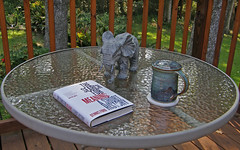 |
| fifteen cents |
Mom and Dad taught me the value of money and how to use it when they first gave me a weekly allowance of 15 cents. A dime went into my piggy bank, a penny went into my church envelope, and I could spend the remaining 4 cents any way I wanted. In order to buy a candy bar, I had to save at least a penny from one week into the next week. Others might have concluded my allowance was only 4 cents, but no one could have convinced me of that. When I got my first paycheck with money deducted for taxes and social security, I was already used to the concept of withholding.
 |
| Camp Fire buddies Sherry, Sandy, and Mary |
The values of those early lessons weren't always obvious until much later, of course. A sharp contrast makes an image appear clear. Neither Don nor John had ever learned to manage money. Don was used to taking money from his Mom's wallet when he wanted it, so that's what he did with my wallet -- always without telling me. One Friday, the only day of the week that I needed more than 15 cents to buy lunch (a dime for a day-old ham and cheese sandwich and a nickel for a snack-sized bag of Cheetos), I was ready to leave with Kris, the woman I worked with, when I found my wallet was empty.
John was used to handing over his entire pay check to his father -- with great resentment -- and then getting from his father whatever he asked for, no matter the cost. The misalignment of earnings to costs was never clear to him, much to the detriment of our relationship. I thought it would work for the two of us to agree we should live on an allowance, so we each took a specific amount from our checks to spend however we wanted. When I used mine on a blender, John accused me of making the decision to use "our" money without consulting with him. He spent all his allowance on lunches. He couldn't comprehend that I would put money from my allowance aside to spend on something tangible. Eventually we settled on using different checking accounts. He had his, I had mine, and we had ours. The allowances went into our personal accounts. When John's checks bounced, he always declared it was the bank's fault.
And I also have felt through all of my life that I needn't worry about money -- when I need it -- if I truly need it -- it will be there. The fact that I won just over $2,000 two months before I planned to quit my job and return to school, with no savings to fall back on, was probably the most dramatic example. I am sure I would have managed somehow without that source, but it made the transition from full-time work to full-time student less intimidating. And then, the fall after the summer I volunteered to drive the Bolivian around Cass and Clay counties, I was diagnosed with mononucleosis and couldn't work so I didn't even have that meager income to cover my rent. Just when I didn't know what I was going to do, the church group that sponsored the Bolivian sent me a check for $100 to thank me for my volunteer work - just enough to pay the rent.
The fifth assignment topic was the meaning of life, aspirations and goals
|
Alex recently told me that one of my previous bosses in the Foreign Service told him I would never get promoted into the senior levels because I cared too much about my staff. Given those options - promotion into the Senior Foreign Service or caring about my staff - I think I made the right choice.
I didn't always want to go to church every Sunday. There were plenty of Sundays when I felt that having to get up early was punishment for having had fun by staying up late on Saturday -- not the best motivation. We older kids felt the twins were getting off too easy by being able to play in the nursery instead of having to sit still and be quiet for a whole hour with us. I didn't think about the fact that handling two toddlers in the pew would have taken away the quiet Mom needed. The end result was worth it. I have amazing siblings who all have amazing kids.
























+by+glenmcbethlaw.jpg)




